The project CHEMOL: Science education for children - Teacher education for students!
Abstract
The project CHEMOL (CHEMistry in Oldenburg) has developed a structure that integrates laboratories for primary-school children into the university education of teachers, both as in-service and teacher training programmes. The CHEMOL lab is visited once or twice a week by different classes. Supported by members of the team and teacher-training students, the children investigate phenomena about fire, water, air, and solids in small groups and they develop and carry out simple experiments themselves. For the visiting children, CHEMOL aims to develop a general understanding of basic concepts of science (with a special focus on chemistry) and basic experimental skills. For student teachers, the project offers the possibility to plan and carry out experimental work with young children and to observe and discuss the children’s ideas. Thus, the CHEMOL project gives the students a chance to transfer their theoretical knowledge about teaching and learning science into practice already during their study time at university. The conceptual approach and results of a small accompanying interview study is discussed in this paper. [Chem. Educ. Res. Pract., 2007, 8 (2), 120-129]
- This article is part of the themed collection: The Laboratory in Science Education: The State of the Art

 Please wait while we load your content...
Please wait while we load your content...